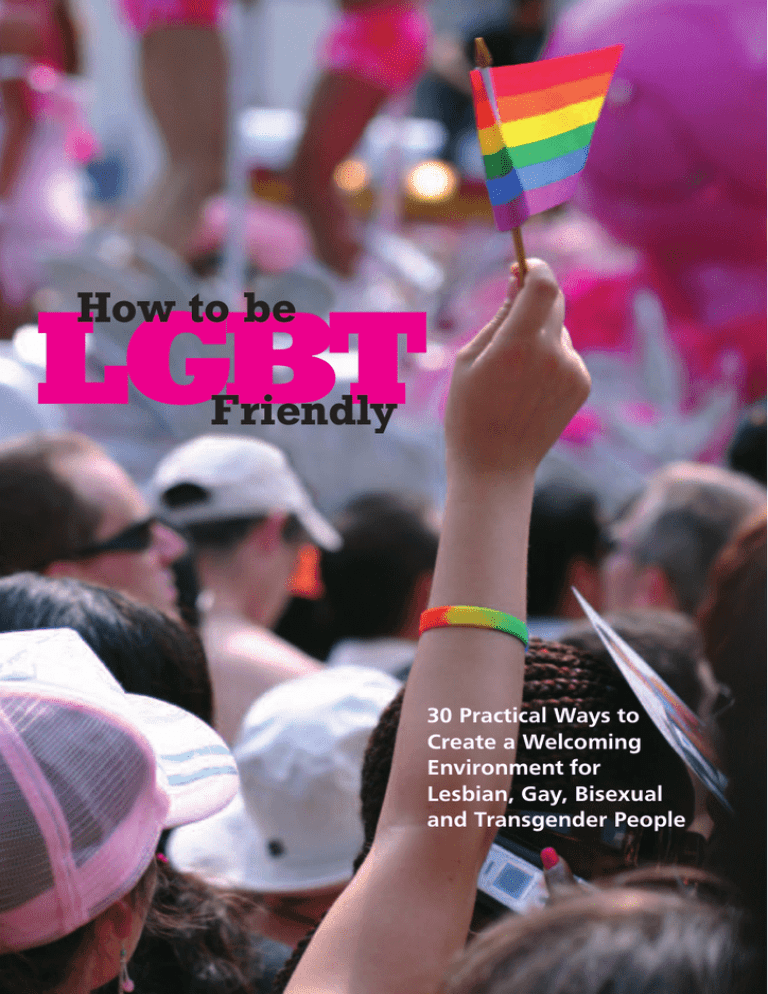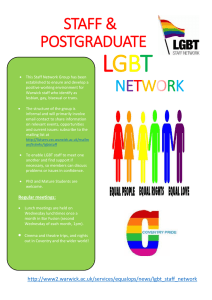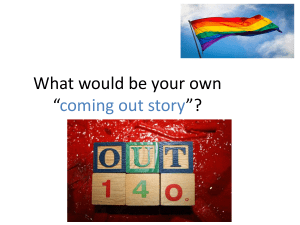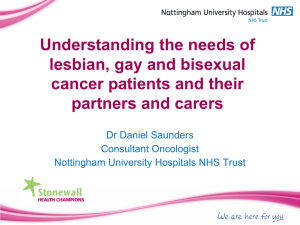
How to be
LGBT
Friendly
30 Practical Ways to
Create a Welcoming
Environment for
Lesbian, Gay, Bisexual
and Transgender People
There are approximately 57,500 people in Leicester,
Leicestershire and Rutland who identify as lesbian, gay,
bisexual or transgender (LGBT). Add to these family
members, friends and children of LGBT people and it becomes
clear that LGBT issues impact on a large segment of society.
02 HOW TO BE LGBT FRIENDLY
Lesbian, gay, bisexual and transgender people come from
diverse backgrounds with very different life experiences and
expectations. There are LGBT people in all of Leicester,
Leicestershire and Rutland’s cultures, communities and
geographical areas. But we are united by one thing organisations and individuals often discriminate against us,
ignore our needs and aspirations or even deny our existence.
We live in a society which generally assumes that everyone is
heterosexual and has a fixed gender identity. This can make
some LGBT people feel excluded, isolated or unwelcome.
Prism, the LGBT Forum for Leicester, Leicestershire and Rutland,
has produced this booklet to help organisations that want to
be welcoming to LGBT people. The recommendations in this
guide are not a plea for ‘special’ treatment, they are simply
guidelines for creating an environment which is safe and
open to everyone.
Prism would like to thank the Big Lottery Fund for their
financial support and Bradford Equity Partnership, on whose
original concept this booklet is based.
Prism
May 2008
01
Listen to how people describe their own identity, gender,
partners and relationships and reflect their choice of language.
02
Avoid making assumptions about a person’s sexual orientation
or gender identity: use gender-neutral terms such as partner(s).
03
Many languages use terms to describe LGBT people which
may be derogatory. If you are translating material, be aware
of the cultural context of the terms you are using.
04
A cautionary note: some LGBT people may have reclaimed
derogatory words such as ‘dyke’, ‘fag’, ‘queer’ or ‘tranny’ to
describe themselves but it isn’t appropriate for your
organisation to use these words to describe people. As a
general rule people should avoid using the label ‘homosexual’
as it is still viewed negatively. Most people are happy with
lesbian, gay, bisexual or transgender but if in doubt - ask!
03 HOW TO BE LGBT FRIENDLY
Language
04 HOW TO BE LGBT FRIENDLY
Policies
05
Display a visible non-discrimination statement, for example:
‘our organisation provides equality of services and care to
everyone, regardless of people’s age, disability, gender,
gender identity, race, religion or belief or sexual orientation.’
Make sure your staff know what this means!
06
Make sure that your organisation’s equality and diversity
policy and statement are on display and publicised.
07
Display clear statements on zero tolerance for racist or
homophobic language.
08
Monitor the sexual orientation of all staff and service users,
in line with confidentiality and data protection protocols and
with an opt-out option for those who prefer not to disclose
this information. This enables you to identify gaps in service
provision and staffing balance. Any form used needs to state
clearly what the information will be used for. Without this
monitoring LGBT people’s exclusion will continue to be
ignored.
09
Ensure confidentiality to all staff and service users, unless they
personally choose to be ‘out’ themselves. Confidentiality can be
a matter of personal safety rather than purely about privacy.
Explore ways of creatively integrating LGBT issues into your
work rather than separating them out or having them as an
add on.
11
Be careful in areas where you have gender segregation as a
policy and ensure that you have included the needs of
transgender people.
12
LGBT people come from all sectors of the community. Good
access principles still apply - ensure that you provide
appropriate access in terms of all equality issues.
05 HOW TO BE LGBT FRIENDLY
10
06 HOW TO BE LGBT FRIENDLY
Staff
13
Provide training for all staff - paid and unpaid - on LGBT
issues. This gives out a clear message that discrimination
against LGBT people is not acceptable and improves people’s
understanding of the discrimination that LGBT people may
face. (You can get help with training from Leicester LGB
Centre. If your organisation has Equality Officers they may
also be able to help.)
14
Encourage all staff and volunteers to challenge negative
comments and ‘jokes’ about LGBT people and/or LGBT issues,
and ensure that people know this is their responsibility. This
particularly applies to managers who have responsibilities for
ensuring equality in the workplace and for services provided
under statutory employment regulations and is a legislative
duty.
15
Encourage staff members to report incidents of homophobic
abuse, whether they occur within or outside the workplace.
Take any reports of homophobic behaviour within the
workplace seriously, and act on them promptly. Have
information about reporting hate incidents to the Police or
to a third party reporting centre readily available.
16
Information about staff members’ sexual orientation and
gender identity should be considered strictly confidential and
should be treated as such by HR departments.
Support role models: for example LGBT staff who are ‘out’.
Staff should be encouraged to attend organisational LGBT
networks/support groups in paid time. Display posters which
publicise such groups and/or which feature positive images
of, or statements about, LGBT people.
18
If your organisation has frontline staff it’s vitally important
that, as the first point of contact, they treat everyone with
equal respect, regardless of their identity.
19
Many organisations require people to sign in on arrival for
health and safety reasons. People attending an LGBT event
should be able to protect their identity by using first names
only or by anonymising the nature of the meeting.
20
Advertise your vacancies and services in the LGBT press and
through local LGBT groups.
21
Keep up-to-date information about local LGBT groups and
organisations and other relevant resources. This will assist
with staff awareness, referrals and networking.
07 HOW TO BE LGBT FRIENDLY
17
08 HOW TO BE LGBT FRIENDLY
Involvement
22
When publicising events and consultations, remember that
many LGBT people do not go to gay venues. Publicise events
and services in mainstream venues and publications as well as
in specialist arenas.
23
If you are using community groups to assist you in
consultation or involvement work, support them by either
providing administrative support or paying for their work.
24
Consider using a neutral venue for meetings, or a place where
LGBT people feel safe to be open such as an LGBT Centre.
25
When working with LGBT people, it is important to
remember that they are least likely to be ‘out’ in the place
they live because of the possibility of harassment and
compromising personal safety. This may particularly be an
issue in neighbourhood work.
26
Whilst there is commonality between lesbian, gay, bisexual
and transgender people, some issues will be specific to
individual communities.
27
Having LGBT information on display creates a welcoming
atmosphere. This could include LGBT posters showing people
from the diverse community in which we live.
28
Use images of LGBT people in a wide range of your publicity
materials, not just in documents which are specifically aimed
at the LGBT community. This sends out a clear message that
you recognise the positive contribution that LGBT people can
make to our society and that your entire organisation is
welcoming to LGBT people.
29
Ensure that posters and information are clearly visible and
that they remain on display.
30
Support LGBT communities by advertising your organisation
in LGBT publications, sponsoring LGBT events or working in
partnership with LGBT organisations.
09 HOW TO BE LGBT FRIENDLY
Information
& Visibility
Local Organisations
Useful Contacts
Leicester LGBT Centre
Leicester LGBT Centre is one of the longest established centres
in the country. Situated in Leicester city centre, it is the only
major organisation in Leicester, Leicestershire and Rutland
focussing solely on improving the lives of local LGBT people.
The Centre runs a telephone helpline and the Q15 Drop-In,
an informal, welcoming café space which operates several
lunchtimes a week. We host various social and support
groups and runs a vibrant youth service both in the city and
in Leicestershire. We also offer volunteering opportunities,
LGBT-friendly counselling and an LGBT resource library.
10 HOW TO BE LGBT FRIENDLY
The Centre’s website, www.llgbc.com, is regularly updated
and is a good source of information about local resources
and events. The Centre also has an extensive mailing list and
sends out regular e-bulletins keeping people up-to-date with
what’s going on locally.
Leicester LGBT Centre provides expert training, consultancy
and advice on a range of LGBT issues. We have a wellequipped training/meeting room which can also be hired by
outside organisations. Please contact us for more details.
Leicester LGBT Centre, 15 Wellington St, Leicester, LE1 6HH
0116 2547412 • info@llgbc.com • www.llgbc.com
Prism
Prism is the LGBT Forum for Leicester, Leicestershire and
Rutland. We are a group of people who live or work in
Leicester, Leicestershire or Rutland and who want to work
together and with Leicester LGBT Centre to improve the
services offered to LGBT people locally. We highlight issues of
concern to the local LGBT community and work with other
local organisations to develop best practice in service provision.
Prism can be contacted through Leicester LGBT Centre
(contact details on page 10) or by emailing prism@llgbc.com.
Leicester Parents Support Group
www.leicesterparents.org.uk
Contact through Leicester LGB Centre:
0116 2547412
11 HOW TO BE LGBT FRIENDLY
The Leicester Parents Support Group is made up of parents
of gay sons and lesbian daughters. Our group exists to help
families and their lesbian and gay offspring to understand,
love and offer support where needed.
Trade Sexual Health
Trade is a sexual health charity based in Leicester for anyone
living in Leicester, Leicestershire and Rutland. Trade provides
free and confidential advice and support to anyone who
identifies as gay, lesbian, bisexual, man who has sex with
men (MSM) or woman who has sex with women (WSW). We
provide safer sex packs for men and women and can offer
one-to-one emotional and practical support. Visit our website
at www.tradesexualhealth.com for more information.
Trade, 15 Wellington Street, Leicester, LE1 6HH
0116 254 1747 • info@tradesexualhealth.com
www.tradesexualhealth.com
12 HOW TO BE LGBT FRIENDLY
Leicester LGBT Helpline
Leicester LGBT Helpline is staffed by trained volunteers and
provides support, advice and information to LGBT people
and people who are questioning their sexuality in Leicester,
Leicestershire and Rutland. Open Tuesdays and Thursdays,
7.30pm to 10.00pm – an answerphone is available outside
these times. You can also email for information.
0116 255 0667 • helpline@llgbc.com
Homophobic and transphobic hate crime is serious and
should be reported. Incidents can be reported directly to
Leicestershire Constabulary by calling 0116 222 2222 (in an
emergency dial 999).
If you want to report a hate crime or incident in confidence,
you can do so in the following ways:
• Through Leicester LGBT Centre.
• Through Trade Sexual Health.
• Through Leicestershire’s Hate Incident Monitoring Project
• on 0116 305 8263 or online at www.leics.gov.uk/reporthate.
The LGBT Community Safety Forum is a space for honest
debate and discussion on policing the LGBT community. It
brings together representatives from Leicestershire
Constabulary, Leicestershire Police Authority and the Crown
Prosecution Service with members of the local LGBT
community. If you are interested in joining the Community
Safety Forum, contact the Leicestershire Constabulary
Community Safety Bureau on 0116 248 4978 and ask to speak
with the Hate Crime Officer.
13 HOW TO BE LGBT FRIENDLY
Community Safety
Hate Crime Reporting
National Organisations
Stonewall
Stonewall is the UK’s largest campaigning and lobbying
group on LGB issues.
0800 502 020 • www.stonewall.org.uk
FFLAG
Families and Friends of Lesbians and Gays (FFLAG) is a
national voluntary organisation supporting the parents and
families of LGB people.
0845 652 0311 • www.fflag.org.uk
Broken Rainbow
Broken Rainbow offers support to LGBT victims and survivors
of domestic violence and abuse.
14 HOW TO BE LGBT FRIENDLY
0845 260 4460 • www.broken-rainbow.org.uk
UK Lesbian & Gay Immigration Group
The UK Lesbian & Gay Immigration Group (UKLGIG) provides
advice on immigration and seeking asylum for LGB people.
020 7922 7811 • www.uklgig.org.uk
Bi Community News
Bi Community News is the hub of the UK’s bisexual community.
www.bicommunitynews.co.uk
The Gender Trust
The Gender Trust is the UK’s largest charity for people with
gender identity issues.
15 HOW TO BE LGBT FRIENDLY
0845 231 0505 • www.gendertrust.org.uk
Want to Know More?
Comprehensive information and links to a wide
range of local and national organisations and
groups can be found at www.llgbc.com.
A large print version of this document is available.
This can be downloaded from www.llgbc.com
or call 0116 254 7412 to request a copy.
This guide is produced by Prism, the LGBT Forum for Leicester,
Leicestershire and Rutland.
Prism is hosted by Leicester LGBT Centre, with financial
support from:
Images: iStockphoto • Design: Paul Wishart 0116 270 2148



